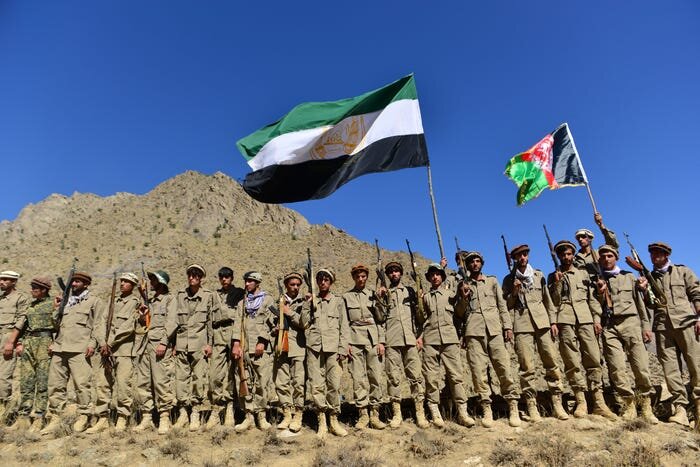Iran draws red lines on Afghanistan

TEHRAN – In the first sign of turnabout, Iran issued warnings in multiple directions as Taliban forces announced the “conquest” of the last opposition foothold in the Panjshir valley.
After weeks of strictly sticking to a line of neutrality, Iranian Foreign Ministry spokesman Saeed Khatibzadeh struck a note of warning about the Taliban takeover of Afghanistan.
Speaking at a weekly press briefing on Monday, Khatibzadeh warned about foreign meddling in Panjshir, the last stronghold of opposition against the new order led by Ahmad Massoud who is the son of legendary anti-Taliban commander Ahmad Shah Massoud. Khatibzadeh also strongly condemned the Taliban attack on the valley and described the death of opposition leaders there as “martyrdom,” a major indication of Iranian resentment at the Taliban’s inchoate political deliberations to form a government.
The remarks came on the same day a Taliban spokesman announced that the group’s forces “conquered” the provincial capital of Panjshir. Taliban media also circulated video footage showing Taliban forces posing in front of Panjshir’s governor-general office and raising the flag of what came to be known as the Islamic Emirate of Afghanistan.
Meanwhile, Afghan and Iranian social media platforms and news outlets were abuzz with reports of Pakistani aerial support for the advancing Taliban forces in Panjshir. There were even reports that Fahim Dashti, the spokesman for Massoud-led forces known as the National Resistance of Afghanistan, was killed in a Pakistani drone strike.
Responding to a question about the Pakistani involvement in the battle for Panjshir, Khatibzadeh said, “The news coming out of Panjshir is concerning. Last night’s attacks [on Panjshir] are condemned in the strongest terms. Martyrdom of Afghan leaders is deeply regrettable.”
Khatibzadeh said Iran was reviewing the reports of foreign intervention. “This should be reviewed,” he asserted.
Khatibzadeh pointed out, “Afghanistan’s history shows that foreign intervention, both direct and indirect, has resulted in nothing but defeat for the aggressor force, and the Afghan people are independence-seeking and zealous, and certainly any intervention is doomed,” he said.
The Panjshir issue must be resolved through dialogue, with the mediation and presence of all Afghan elders, Khatibzadeh underlined amid reports of the Taliban advance into the valley.
The spokesman noted, “Neither side should allow this path to lead to fratricide. The Taliban must abide by its own obligations under international law and its own obligations by whatever it says. Starving the people of Panjshir, besieging the Panjshir region, cutting off water and electricity in this region is a matter of concern.”
Khatibzadeh stressed that “humanitarian law under international law must be respected.” He once again called for an inclusive government to be established in Afghanistan, one that would include all ethnoreligious groups of the war-torn country.
“The Islamic Republic of Iran is making every effort to help end the suffering of the Afghan people and to form an inclusive government in Afghanistan that reflects the country's ethnic and demographic composition,” he stated, adding, “It is the will of the people that must finally be realized and determine the future of Afghanistan, not foreign intervention or any other conspiracy. Certainly, lasting peace can only be achieved through intra-Afghan dialogue between all groups.”
Underlining that Iran is closely following the developments in Afghanistan, Khatibzadeh warned, “I strongly warn that all red lines and obligations under international law should be observed.”
The change in Iran’s tone toward the Taliban is the latest indication that the group urgently needs to address the concerns of its neighbors in a transparent way and avoid traps that could be set for it by some predatory players in the region who stand ready to drag Afghanistan into a costly and deadly power competition.
Like many other countries bordering Afghanistan, Iran has its own concerns about the future of this country under Taliban rule. A primary concern is that some countries in the region would tempt the Taliban into adopting stances against Iran. The United Arab Emirates, Bahrain, and to some extent Saudi Arabia and Turkey have already reached out to the Taliban. Officials from the UAE, among other counties, are currently working to get the Kabul airport operating again, according to Taliban spokesman Zabihullah Mujahid. This is while the UAE has not disclosed its involvement in the airport’s rehabilitation. It only said that it sent a plane carrying humanitarian aid to Kabul.
In addition, Pakistani Prime Minister Imran Khan has spoken with Saudi Crown Prince Mohammad bin Salman and Abu Dhabi Crown Prince Mohammad bin Zayed, two of Iran’s staunch rivals to say the least, on Afghanistan. But will they help with Afghanistan without expectations? That remains to be seen. What can be certainly said is that countries are not charities. Therefore, the Taliban should be aware of what its new allies demand from it. At the end of the day, any hostile posture by the Taliban against Afghanistan’s neighbors will not secure the long-term interests of the Afghan people.
Another concern that the Taliban need to address is to avoid marginalizing other ethnic and religious groups when forming a government. Nearly all countries, including Iran, have called on the Taliban to form an inclusive government. Not doing so would enrage the international community and isolate the Taliban government on the global stage.
Leave a Comment